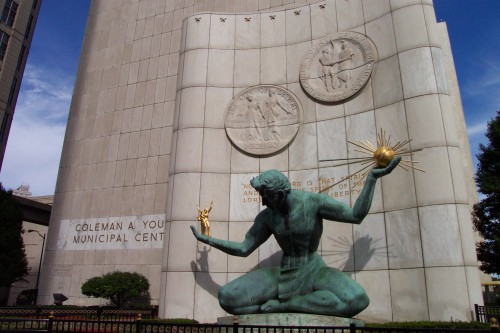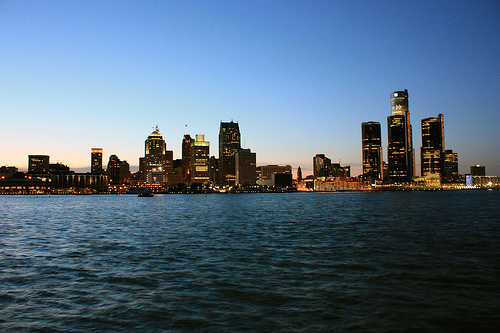 “The Spirit of Detroit” is still strong.Photo: Adam EdwardsMy husband, Adam, and I have many traits in common: our biracial heritage; left-handedness; a penchant for public transportation; and, perhaps most significantly, a deep, irrational (OK, borderline scary) passion for our hometowns. As I’ve mentioned, my city of origin is Seattle. His is Detroit.
“The Spirit of Detroit” is still strong.Photo: Adam EdwardsMy husband, Adam, and I have many traits in common: our biracial heritage; left-handedness; a penchant for public transportation; and, perhaps most significantly, a deep, irrational (OK, borderline scary) passion for our hometowns. As I’ve mentioned, my city of origin is Seattle. His is Detroit.
I know what’s coming, believe me. As a Motown booster by marriage, I’ve heard every joke and disparaging remark there is to hear about Detroit, frequently from people who’ve never set foot in the city. The remarks don’t accomplish much, since, like everyone else who hasn’t been living under a rock, I am very aware of Detroit’s challenges. (I assume most Grist readers live above ground, so I’ll spare you the rundown.)
New(ish) Mayor Dave Bing has said that Detroit won’t recover if it can’t attract and retain middle-class families. Unfortunately, the city isn’t especially well positioned to do that. By almost every official measure, from employment to crime to education to transportation, Detroit falls short in the livability department.
There are smart, committed people working on these issues, but it’s safe to say that Detroit hasn’t topped any recent “best places to raise a family” lists. (It has, however, bottomed at least one.) And yet, there are a surprising number of people who are choosing to raise their children there. Some are transplants attracted by low-cost housing. Some are visionaries who want to build a business or make a difference. Many, like Free Press columnist Stephen Henderson, are Detroit natives who love the city and want to be a part of its transition. This is what he wrote back in 2007:
But I’m back anyway, in the ‘D’ as they now say, and my best alibi is that it’s for matters of heart more than soundness of mind … My memories here have an almost tactile intensity, and they define the contours of what I want for my young family.
I’ve been to Detroit a total of seven times. This hardly makes me an expert on the city. Other than downtown/Midtown, Adam’s childhood neighborhood of Rosedale Park, and Belle Isle, I can’t even claim to have seen much of it up close. But my admittedly limited experience with my “city-in-law” has given me a pretty good understanding of why there are still parents who think the words “Detroit” and “family” belong in the same sentence.
Don’t get me wrong; I don’t want to live in Detroit. (I might, however, end up there one day so, future possible fellow Detroiters: Please don’t take offense.) This is partly because I don’t want to live anywhere but my own original city (see above) and partly because Detroit’s not really my kind of place. I’m not especially fond of sub-freezing temperatures or car worship, and I still don’t understand all the fuss over those glorified chili dogs Michigan folk refer to as “Coneys.” (I did manage to inhale several both times I was pregnant, though.)
Still, there’s lots to like about Detroit from a parent’s perspective. Here is some of what the families who are sold on Detroit (and I) see in the place.
Culture
Detroit offers almost limitless cultural opportunities. The museums alone will keep little ones enriched through grad school. On my first visit, I spent half a day gaping at the Rivera frescoes at the Detroit Institute of Art and another half day touring the Charles Wright Museum of African American History. (I’ve visited that museum on every subsequent visit, BTW.) Detroit’s symphony is one of the best in the country, and the tradition of Motown as a mecca for R&B is alive and well. The city still turns out amazing artists, and live music is everywhere — at restaurants, on the streets, and at the many festivals hosted there.
Public art abounds. From the Joe Louis Fist, to the Noguchi Fountain, to the Pewabic Tile People Mover stations, to the amazing architecture, to the graffiti masterpieces in the Dequidre Cut, there’s a lot of visual inspiration in Detroit.
Community
Negative image or no, Detroiters are proud of their city. The natives I’ve met, almost to a person, speak of the place with a reverence and pride that is rare for any city, let alone one so maligned. When Detroit hosted the Super Bowl in 2006, residents volunteered to be part of an official/unofficial welcome wagon. They stood on street corners in the cold, passing out maps and brochures and asking folks if they needed help with anything. (Imagine that happening in a place that takes tourists for granted.)
Detroit may not have the foot traffic of denser cities, but what it lacks in face-to-face contact it makes up for in friendliness. It’s small-town friendly — the kind of place where you can strike up conversations with strangers. This sense of community makes the few areas in Detroit where you can find a bit of urban bustle — Eastern Market, Greektown, the Riverwalk, Campus Martius — all the more enjoyable.
Character
Raising kids in a city isn’t just about providing them with resources and advantages. It’s also about helping them grow up. Yes, Detroit’s economy is struggling, and it’s missing a lot of the amenities that are taken for granted in more prosperous places. And yes, Detroit has a lot of poor people. Sheltering kids from poverty — or any difference that makes us uncomfortable — might provide the illusion of protection in the short run, but it doesn’t teach them to cope with the world they will face as adults. Nor does it teach them to feel compassion for and kinship with the wide variety of people they will encounter in the future.
Choosing to stay in a city with problems also provides lessons in commitment and responsibility. As Stephen Henderson put it:
Do I want to show my son that it’s OK to turn your back on home, just because it’s a place having a tough time? Would I want to tell my daughter that the easy choice is always better than the difficult one?
Coming back, especially now, says to both of them that there’s significance in what we feel for where we’re from. It says being close to that feeling has a value that trumps comfort; it certainly outdoes complacency.
No, I’m not ready to raise my family in Detroit, but I tell you what: I sure do enjoy my visits. And I have hope for the city. Because, (real and hyped) problems aside, Detroit is a place with a rich history, a strong identity, and a sense of community and place. Despite all its problems, Detroit is a city that people love.


